© 2025 ALLCITY Network Inc.
All rights reserved.

Last night was pretty fun, eh?
With the first night of the Stanley Cup Playoffs in the books, it’s time for the Colorado Avalanche to continue their journey. A team full of expectations and with an excellent roster top to bottom, Colorado is a heavy favorite in the first-round series that begins today against Central Division rival Nashville.
The Avalanche and Predators met back in the spring of 2018 in remarkably similar situations, only in reverse. Back then, Nashville was the top seed and Colorado the last team in, their fate decided on the final day of the regular season. The Avs entered that series with their backup goaltender in net, same as the Predators will as Juuse Saros has been ruled out of Games 1 and 2 with the rest of the series in doubt.
A lot of fun parallels, but this series preview isn’t about the cosmic stuff that lined up nicely. No, this is about how the teams actually square up against each other. I’ll be showing some things from both teams but primarily focusing on the Predators under the assumption that if you’re reading this, you’re already pretty familiar with the Avalanche and the basics.
We’ll just start there for now. A basic statistical look at both teams on the whole before diving deeper into who the Nashville Predators are and what they do well that the Avalanche need to key on in Round 1.
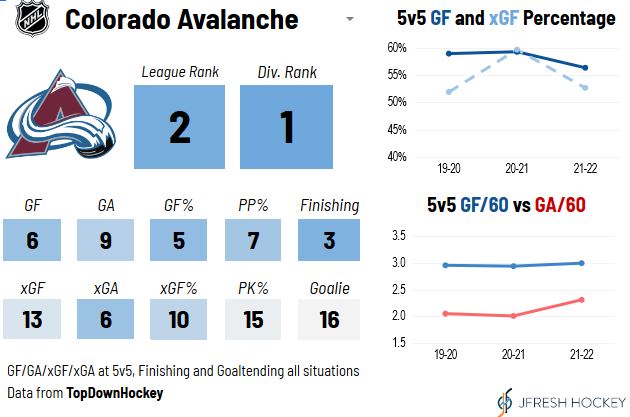
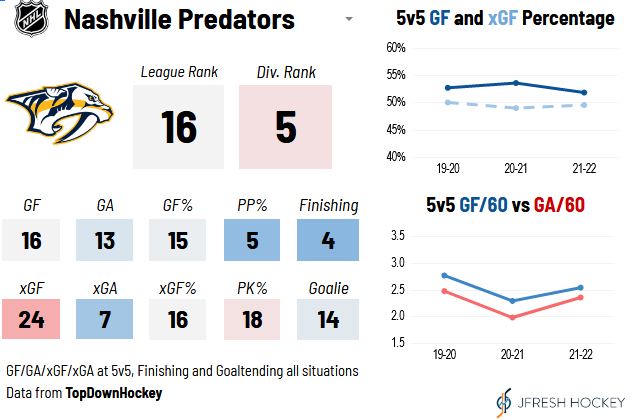
What really stands out about the Avalanche is they’re pretty good at everything. The things they struggle the most at, goaltending and the penalty kill, are well-worn territory and spent most of the season on the climb after poor starts.
Looking at Nashville, you see the profile of a solid hockey team that excels at a few things but certainly isn’t elite.
Their power play creates quality chances and does a good job of finishing those chances, which are the areas in which they are the strongest on the team card. Their goaltending is deceptively low as Saros could be a Vezina finalist, but without him around for the start of the series, it will either be backup David Rittich or Connor Ingram to tend the net. That’s a very large step down.
Where you see the Predators really struggling, especially in comparison to their longstanding reputation as one of the league’s best defensive teams and one-time factory of quality blueliners, is on the back end.
While Roman Josi is the only conceivable option for the Norris Trophy next to Cale Makar, the rest of the Predators defense is far from special and even Josi himself, while unbelievable offensively (96 points, come on), is nothing to write home about in his own zone.
As we’ll get into below, Colorado has a conceivable advantage in nearly every area but the one that could have really been dead even this series was with a healthy Saros. Let’s take a look and see just how large of a step down in quality Rittich is.
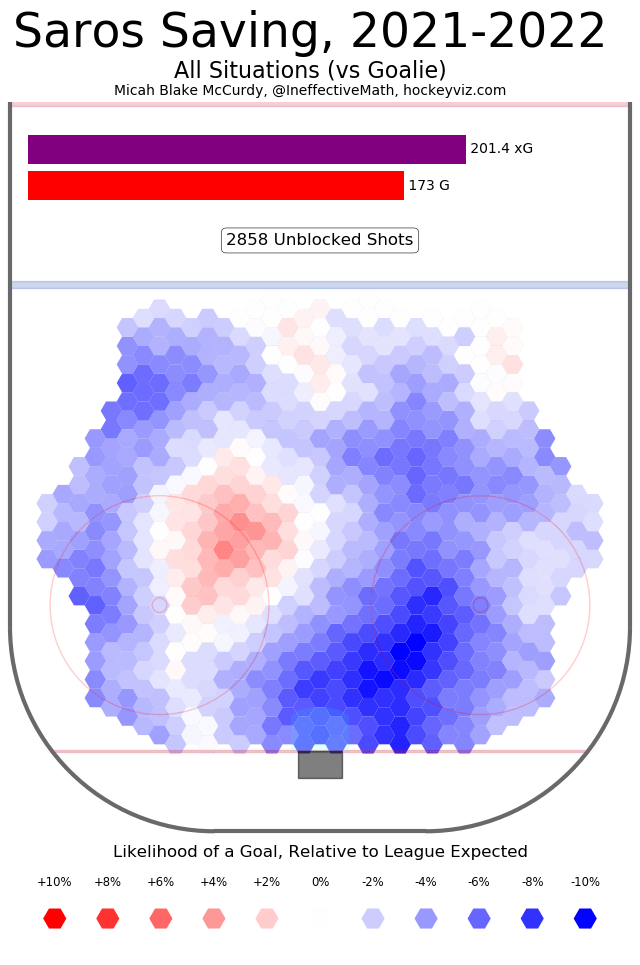
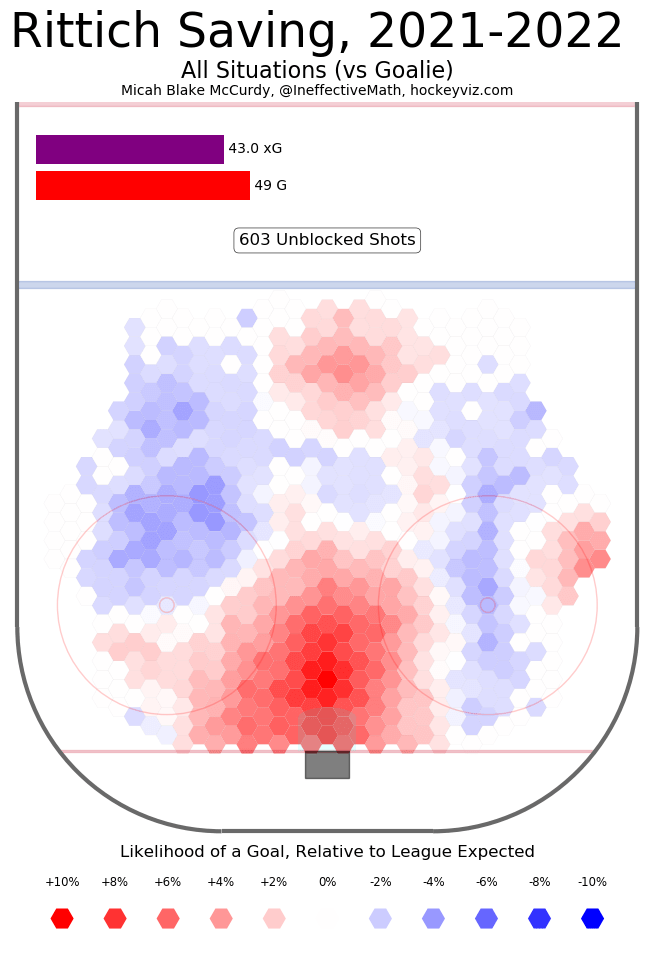
If you’ve never seen this graph before, it’s very simple to read. Expected goals (xG) is how many goals were expected to be scored based on the quality of the shots taken against. While Saros prevented far more goals than expected, Rittich was the opposite in allowing more than he should have along the way.
Simply put, there’s a reason “Big Save Dave” was jettisoned from Calgary when the Flames gave huge money to Jacob Markstrom and he is now the clear-cut backup to Saros in Nashville.
Next to Josi’s brilliance, Saros is the other primary reason this Predators team even made the postseason to begin with. Going from his work, a .918 save percentage, to the ghastly body of work put forth by Rittich and his .886 (!) save percentage is on its own likely a fatal blow to Nashville’s postseason hopes.
Rittich has certainly shown better in his career and in a best-of-seven series we’ve seen plenty of wild things happen, but given the quality of Colorado’s shooters and the very mediocre defense in front of Rittich, he will have nowhere to hide. There’s a reason Ingram and his three games of NHL experience is even in consideration for playing time here. It’s been that rough for Rittich.
Moving beyond goaltending and to the Predators themselves, it’s easy to start at their top line.
The trio of Matt Duchene, Mikael Granlund, and Filip Forsberg has been nothing shy of awesome.
Old pal Duchene set new career highs in goals (43) and points (86) this season. Similarly, Granlund’s 53 assists set a new career-best mark and Forsberg obliterated all previous bests in goals (42), assists (42), and points (84).
That’s a pretty formidable top line.
The Predators also got the otherworldly season out of Josi (96 points on 23 goals and 73! assists) and finally got close to their money’s worth from Ryan Johansen, the perpetually disappointing pivot who lost his 1C job this year to Granlund despite scoring 26 goals of his own.
From there, the Predators leaned on rookies Tanner Jeannot (24 goals) and Philip Tomasino (32 points) for their top scoring forward depth.
I mention all of these numbers specifically because something funny happened in Nashville this season after years of disappointment from high-priced forward imports. The Predators finally got the big offensive breakthroughs on offense but it took an otherworldly amount of good luck to get them there.
While Granlund, Tomasino and Josi all shot under 10% (for Josi that’s normal as a defenseman but go with me here), the other players I mentioned above all experienced insane boosts in shooting percentage.
All of them. Here are the seasons they had against their career averages before this year:
- Duchene – 18.9%, career 12.5% shooter
- Forsberg – 18.6%, career 12.1% shooter
- Johansen – 22.0%, career 12.8% shooter
- Jeannot – 19.4%, rookie season
Now, Jeannot still has a chance to prove he’s just an elite shooter because he did shoot 21.7% last year in a 15-game trial run, but the deck is stacked against him.
If you’re unfamiliar, elite shooters in the NHL largely sit in the 15% range, with some a little higher and some a little lower based on their usage and volume. There are some freaks of nature out there such as Leon Draisaitl and Mikko Rantanen, who live in the 20% range, but they are extremely rare breeds.
For three players all with over 500 NHL games played, those kinds of spikes are insane. They also explain how Josi went from a previous best of 49 assists in a season to an absolutely bonkers 73. In fact, Forsberg, Johansen, and Duchene were three of the top 10 players in all strengths on-ice shooting percentage this year.
In a best-of-seven series against an Avalanche team that is good defensively with the potential to be elite, let’s just say that Nashville is going to need the good luck gravy train to continue riding through town.
What really is a problem, however, is how quickly the scoring drops off on the roster. Having five players over 60 points is great, but things cratered quickly from there and the Predators are going against an Avalanche roster that eight players score 50+.
Offense became Nashville’s calling card, but Colorado is just a little better at it. Let’s see how the Predators look both at 5v5 and on special teams in terms of process.
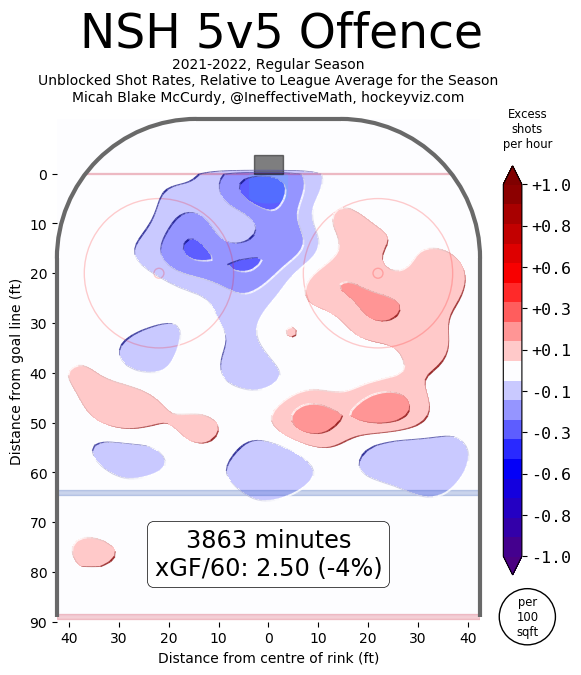
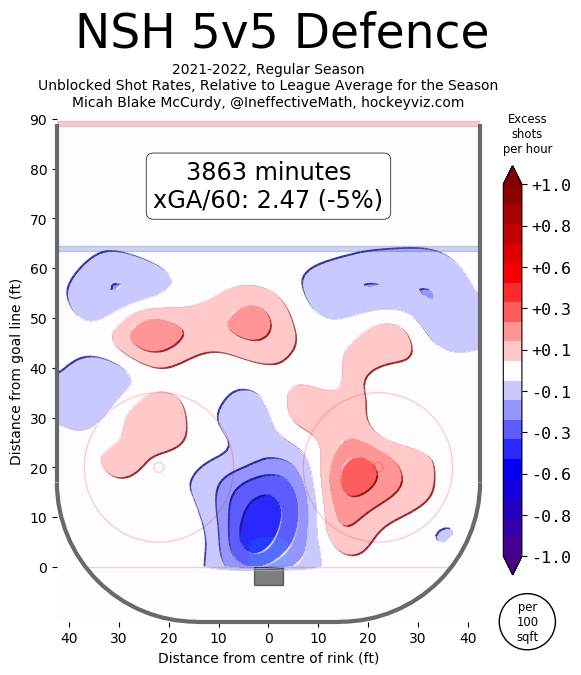
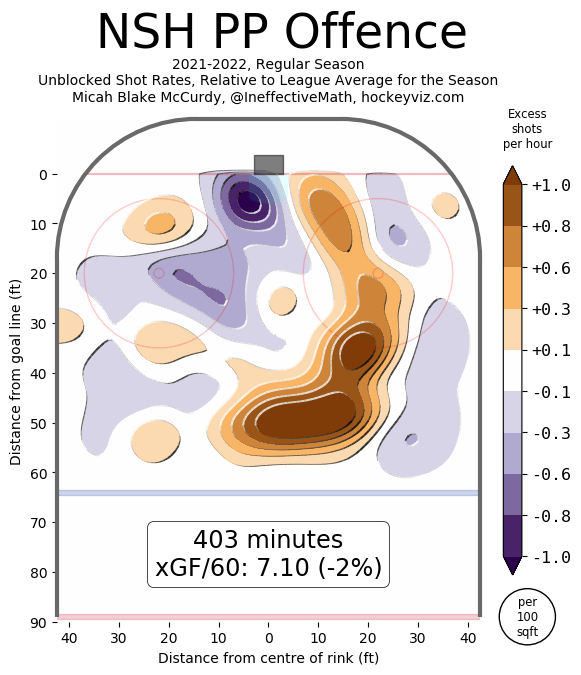
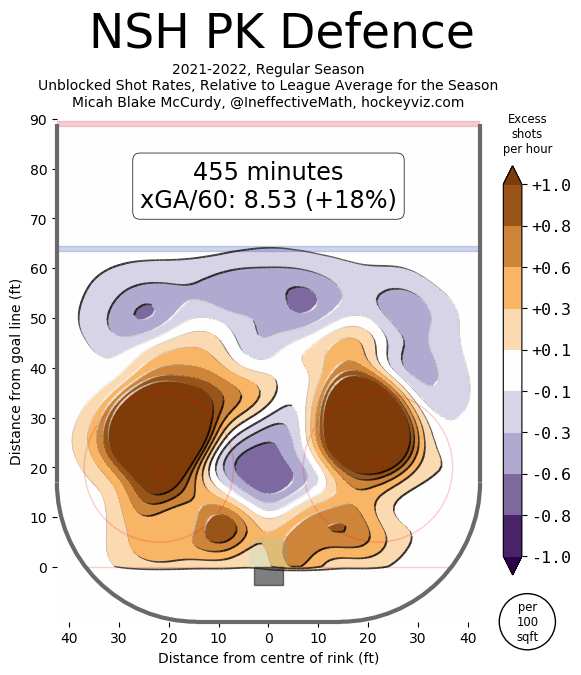
Nashville’s offense isn’t a scary engine but they finished at an insane rate because it had to in order to make up for its weaker overall process. The defense, despite the dearth of high-end talent relative to recent years, actually played pretty well as a unit in their own end.
Outside of Josi, however, they don’t have many natural puck movers and almost nobody who you would consider a genuine threat on the back end. Beyond Josi, it’s a collection of solid players or worse.
The special team numbers here are interesting. While the Predators power play finished sixth in the NHL (Colorado finished seventh), they once again show the marks of a team that finishes the few chances generated versus a team that creates a ton of volume.
The penalty kill, however, will be key here. Colorado finished 15th and Nashville 19th, but were both bailed out heavily by quality goaltending as the units in front of them weren’t particularly good.
They finished heading in two very different directions, however, as Colorado’s PK was the eighth-best in April versus Nashville finishing 27th in the season’s final month.
Special teams always matter, but given Colorado’s status among the league leaders in drawing penalties and the Predators finishing first in penalties taken this year, Nashville’s PK is going to face a seriously daunting task only compounded even more by the Saros injury.
But the hits! The physicality! The nature of the beast that is the Stanley Cup Playoffs means that a physical team such as Nashville gets a lot of intangible love but when I looked into it, the two teams really don’t play that divergent of style.
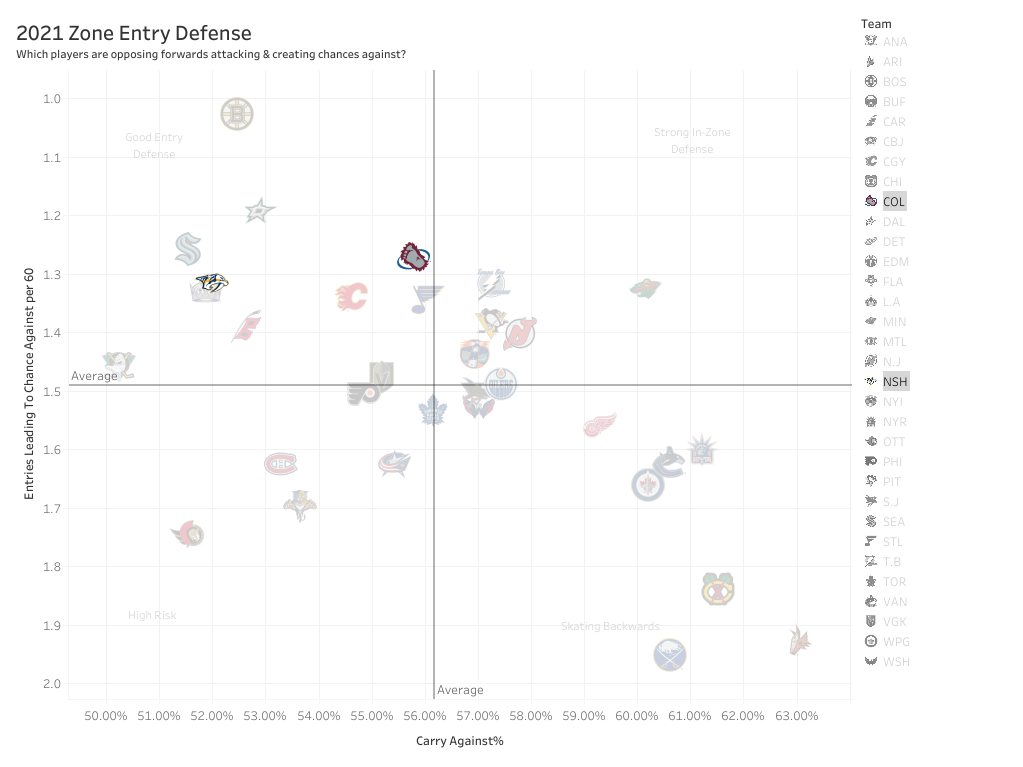
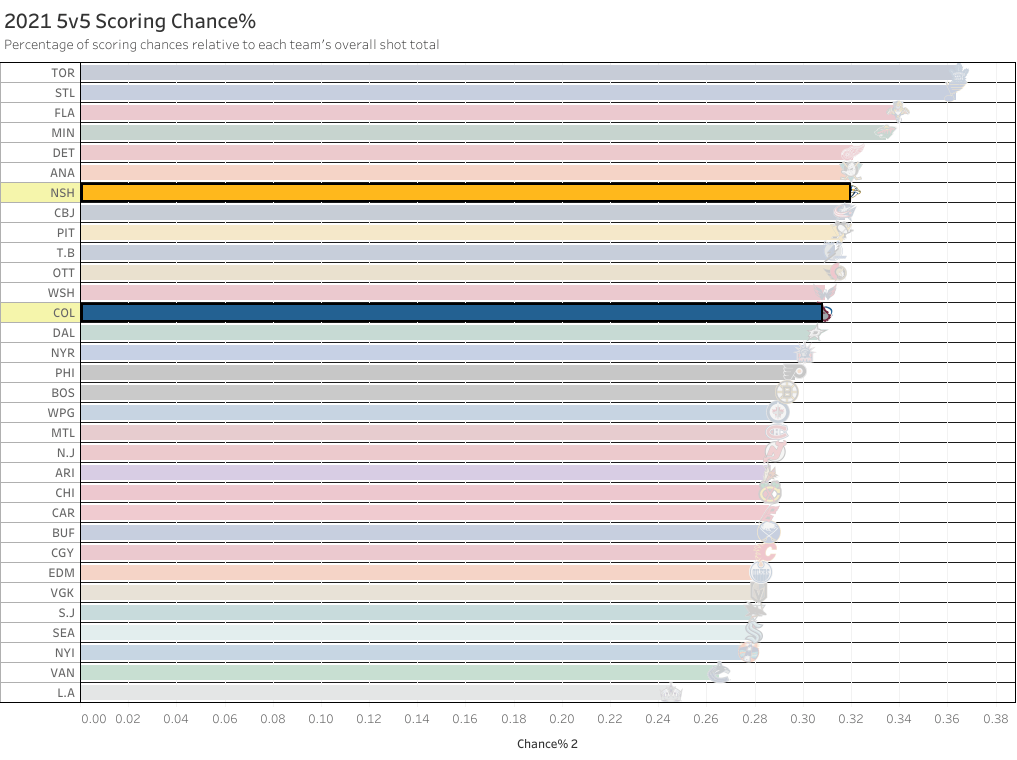
You see here that both teams like to defend the zone entry instead of trying to lock it down after the team has entered the zone with the puck. Nashville is a little better at it, but both clubs will emphasize the tactic of denying zone entries to begin with.
Another area where they stood out as pretty similar was the focus on quality shot attempts. Neither was elite as Toronto and St. Louis really separated from the pack in terms of volume of their quality, but both Nashville and Colorado are in the upper crust of teams that create scoring chances on their shot attempts.
This naturally is a result of quality transition play but also good word on a strong forecheck with quality puck retrievals. It’s in the dump-and-chase game that we really see Nashville and Colorado separate stylistically.
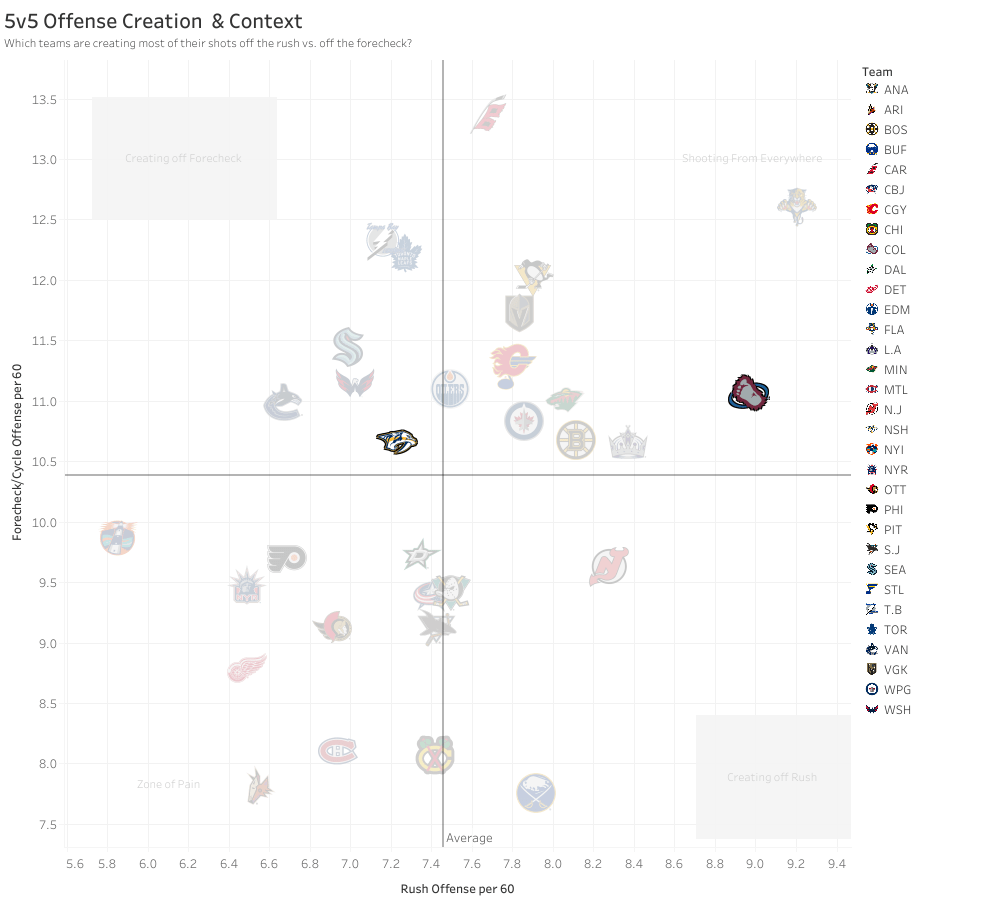
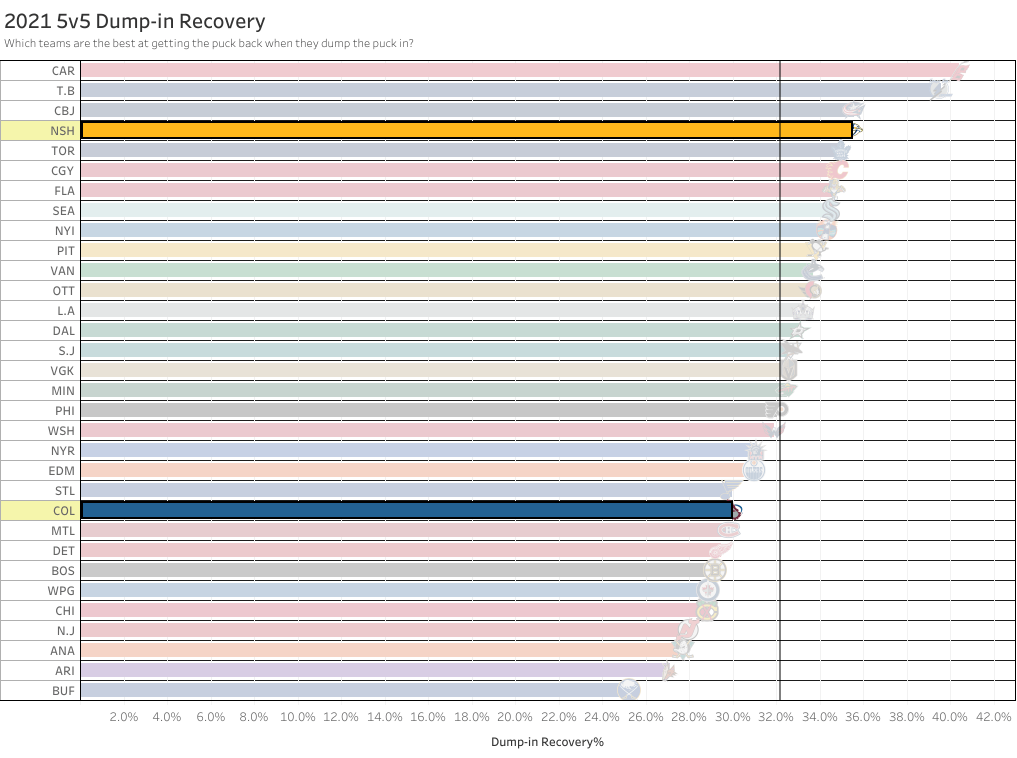
You see here that Nashville loves to create offense off the forecheck and while the Avalanche are capable of it, it absolutely is not their preferred method of generating chances.
Where Colorado differs from previous years is that they don’t lean heavily in one area. The Avalanche used to be an elite transition team but couldn’t play the heavier game, but we see in the first chart in this section that the Avalanche actually excel at creating offense from all areas.
The Predators might force the Avs to play a little more in their style of dump-and-chase, but the Avs are at least capable in that regard. We see here that Nashville struggles to create anything via transition, which plays into a major strength for the Avalanche, as seen above with their zone denials.
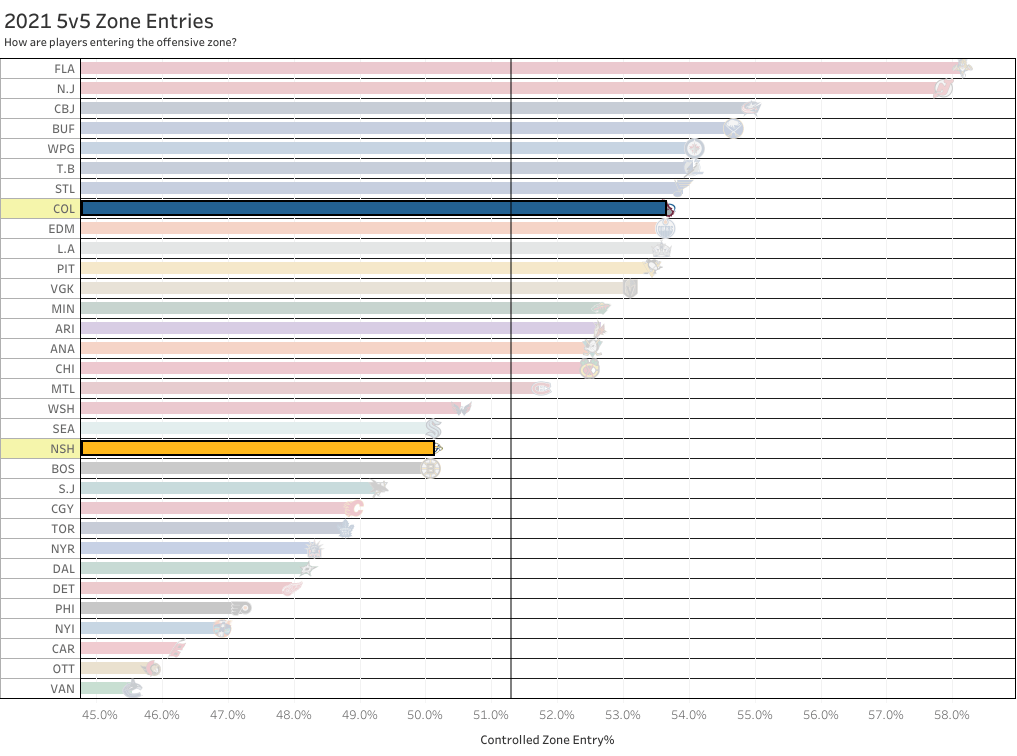
What will be interesting to watch in this area is Colorado’s desire to play with the puck and how aggressively Nashville will chase the hits and put themselves in danger of increased penalty calls.
Does Preds head coach John Hynes go full send into their style and try to beat and bludgeon Colorado, a tactic that has worked in previous years but struggled much more to find effectiveness against this year’s heavier Avalanche team?
Or does Hynes try to get his team to find a more balanced and measured approach, one that reduces the risk of penalties but emphasizes grinding life out in the neutral zone, something neither team really wants?
The tactics from Hynes and Avalanche coach Jared Bednar will be a fascinating development. Nashville’s style has its place against Colorado but the talent disparity, especially in the wake of the Saros situation, simply might be too much for the Predators to overcome.
This Nashville squad isn’t without merits. You don’t have to look very hard to see what makes them dangerous. The problem is what they don’t have in Saros and what appears to be an overwhelming Avalanche advantage in depth on both defense and at forward.
Even if the Predators find a way to stop the buzzsaw that is playoff-form Nathan MacKinnon and Mikko Rantanen (both currently top-10 players all-time in points per game (minimum of 40 games played), Colorado’s depth stands ready to overwhelm Nashville.
I’m not saying the Predators don’t stand a chance. That’s obviously silly. This is the NHL and on any given night, playoff teams are capable of bringing their A-game and getting it done. Can Nashville summon their very best often enough in a best-of-seven to steal the series from the heavy favorite Avalanche?
It’s a very tall mountain to climb, and, well, this is the Avalanche. The mountain just might come down on top of them before they can get there.
Comments
Share your thoughts
Join the conversation



